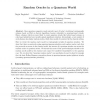Free Online Productivity Tools
i2Speak
i2Symbol
i2OCR
iTex2Img
iWeb2Print
iWeb2Shot
i2Type
iPdf2Split
iPdf2Merge
i2Bopomofo
i2Arabic
i2Style
i2Image
i2PDF
iLatex2Rtf
Sci2ools
109
click to vote
CORR
2010
Springer
2010
Springer
Random Oracles in a Quantum World
Once quantum computers reach maturity most of today's traditional cryptographic schemes based on RSA or discrete logarithms become vulnerable to quantum-based attacks. Hence, schemes which are more likely to resist quantum attacks like lattice-based systems or code-based primitives have recently gained significant attention. Interestingly, a vast number of such schemes also deploy random oracles, which have mainly be analyzed in the classical setting. Here we revisit the random oracle model in cryptography in light of quantum attackers. We show that there are protocols using quantum-immune primitives and random oracles, such that the protocols are secure in the classical world, but insecure if a quantum attacker can access the random oracle via quantum states. We discuss that most of the proof techniques related to the random oracle model in the classical case cannot be transferred immediately to the quantum case. Yet, we show that "quantum random oracles" can nonetheles...
Related Content
| Added | 09 Dec 2010 |
| Updated | 09 Dec 2010 |
| Type | Journal |
| Year | 2010 |
| Where | CORR |
| Authors | Özgür Dagdelen, Marc Fischlin, Anja Lehmann, Christian Schaffner |
Comments (0)

